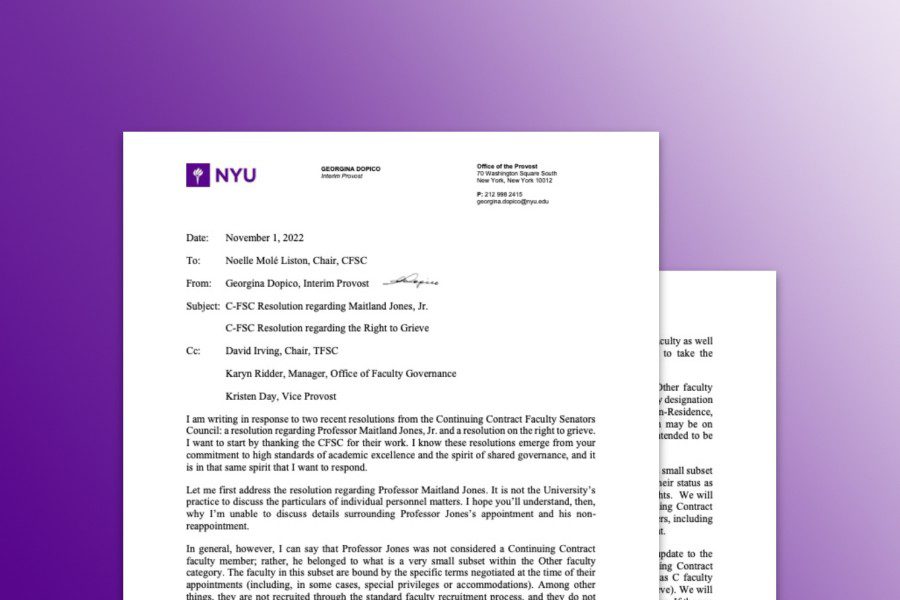Provost promises more transparency after concerns about Maitland Jones firing
NYU has proposed amendments to its Faculty Handbook and the reevaluation of contracts to address faculty concerns following the firing of chemistry professor Maitland Jones Jr. The faculty who initially complained are unimpressed.
NYU is planning on making changes to its faculty handbook following the backlash around the firing of Maitland Jones Jr. (Illustration by Kevin Wu)
November 9, 2022
Last month, a group of faculty passed a resolution in the University Senate calling on NYU to open a formal investigation into the firing of Maitland Jones Jr., the organic chemistry professor who was abruptly fired by the university. In response to the resolution, the university has said it will revise several employment-related policies and definitions in its Faculty Handbook.
Some professors, though, are not satisfied with NYU’s response, and have argued that the university has still not sufficiently explained the circumstances behind Jones’ termination.
“The story of Professor Jones’s dismissal has already traveled around the world,” Heidi White, who sits on the University Senate committee that called for the investigation, told WSN. “Do we now help the university by stonewalling an investigation and trying to cover up the whole affair? This won’t make it go away. Instead, it will keep coming back until the administration does what the senators council has asked.”
White said that several senators representing contract faculty are disappointed by the university’s response. She said that the letter fails to address the circumstances behind Jones’ firing and does not provide adequate explanation to concerned contract faculty.
The group of senators representing contract faculty at the university passed a resolution on Oct. 13, calling for the investigation and for NYU administrators to issue a formal statement to explain why Jones’ contract was terminated. Twenty-six senators voted in favor and one abstained from voting; none voted against the resolution.
Interim Provost Georgina Dopico responded to the council on Nov. 1, detailing actions the university plans to take in response.
“I recognize how difficult this case has been for the entire NYU community,” Dopico’s response reads. “I am hopeful, however, that some good will come from it, both for our faculty and for our students: on one hand, greater transparency about faculty appointment categories and grievance rights, something we will owe to your resolution; on the other, a dialogue about how NYU can become a real leader in STEM education and beyond.”
Jones told WSN that he supported the council’s resolution when it was sent to the university. He did not, however, approve of the university’s response. Jones said that he believes the university is taking action to remedy issues that it refuses to take responsibility for.
“The provost said, in effect, ‘We did nothing wrong and we are going to stop,’” Jones said.
The letter from Dopico explained that it is not typically university practice to share details about individual faculty matters, so did not address the specifics behind Jones’ case.
Along with the resolution regarding Jones, the faculty senators passed an accompanying resolution concerning faculty grievance rights, which allow most faculty at NYU to lodge formal complaints with the university concerning the terms and termination of their contracts. Both resolutions emphasized the confusion caused by Jones’ specific faculty designation.
Jones was placed under a small category of employees called “other faculty,” separating him from adjuncts, contract faculty and tenure-track faculty. According to administrators, this designation made him ineligible to file a formal complaint about his termination, prompting other faculty to voice concerns about their own contractual rights at NYU.
NYU spokesperson John Beckman has not responded to questions about why Jones was determined to be “other faculty.”
According to Dopico’s response, which Beckman said was part of an “ongoing conversation,” the university will no longer hire under the category of “other faculty.” Instead, the designation will only be used for those who were already considered to be a part of this category. “Other faculty” now only includes writers-in-residence, artists-in-residence, global professors, global visiting professors and faculty members whose positions are short term or “visiting in nature.”
There are about a dozen professors currently employed by NYU who are designated as “other faculty,” according to Dopico. The university has committed to contacting them to review their position and the grievance rights that they are entitled to. If any of these faculty members would prefer to be re-categorized as a continuing contract faculty member — which would allow them to submit a formal complaint to the university — they will be given the opportunity to do so.
The university will also propose a change to the Faculty Handbook, which would clarify the meanings of all faculty titles. If, under this policy change, NYU finds that some “other faculty” do not fall under the new description of the role, the Office of the Provost will work with individual schools to modify those positions.
Dopico also promised that the university will not unilaterally convert a contract faculty member into an “other faculty” member.
Elisabeth Fay, an organizer with NYU’s yet-unrecognized union for contract faculty union and a professor at the university’s College of Arts & Science, said that contract faculty members are still left without an explanation as to why Jones was considered to be “other faculty.” The group is continuing to call for a formal response from the university, Fay said.
Fay added that contract faculty are in a particularly vulnerable position since their union is unrecognized — as opposed to adjuncts or graduate student workers, who maintain university-recognized unions.
“Contract faculty currently have no clear means of appealing decisions like this, which is one of the reasons a majority of us have signed cards asking NYU to recognize our union and respect our right to collective bargaining,” Fay told WSN. “Adjunct faculty and grad workers aren’t terminated without due process, and there is never any confusion about what kind of faculty appointment they’re on, because their rights are protected in a legally-binding union contract.”
NYU faculty are entitled to file grievances in certain circumstances, as described by the university’s Faculty Handbook.
Update, Nov. 15: This article was updated to include more context about Elisabeth Fay’s comments about the rights of contract faculty at NYU to appeal employment decisions.
Contact Abby Wilson at [email protected].



























































































































































